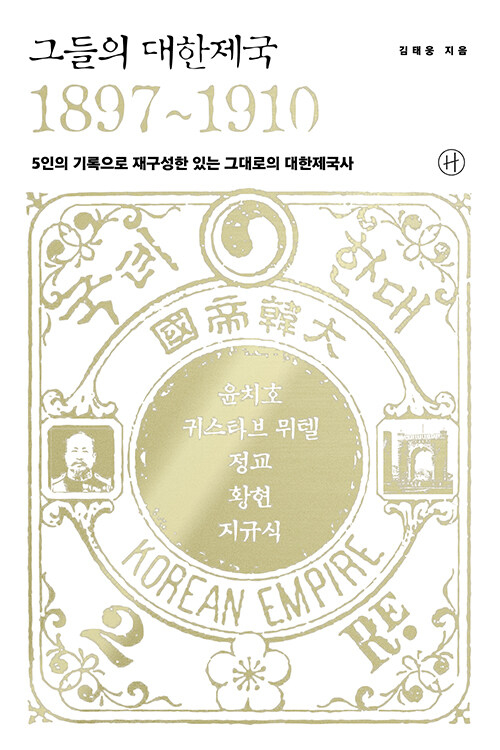From the Birth to the Fall of the Empire
Reconstructing Records by Yun Chi-ho and Others
Expressing the Inner Thoughts on Turbulent Historical Events such as the Assassination of Empress Myeongseong and the Resistance of the Righteous Army, On May 6, 1904, Japanese military officers and officials of the Korean Empire government held a celebration of the Imperial Army’s victory at Juhapru in the rear garden of Changdeokgung. Provided by Humanist
Their Korean Empire 1897~1910,
Written by Kim Tae-woong | Humanist | 928 pages | 44,000 won
The Korean Empire, which existed from its establishment in 1897 until its forced annexation by Japan in 1910, is a subject of mixed evaluations. On one side, it is criticized for having precipitated its own downfall due to a naive understanding of international affairs, while on the other side, it is defended as having pursued modernization but was faced with the limitations of the times.
Professor Kim Tae-woong from the Department of History Education at Seoul National University reconstructs the history of the Korean Empire focusing on records left by five individuals who lived through that period. The author points out that the uncritical citation of the “Annals of Kings Gojong and Sunjong,” edited by the Japanese, only fosters useless debate. He states, “There is a need to create an opportunity to travel back in time to the Korean Empire and become a figure of that era, to feel and ponder the times.”
To showcase the perspectives of contemporaries on the Korean Empire, the author selects the following documents: Yun Chi-ho’s , French priest Gustave Mutel’s , Hwang Hyeon’s , Jeong Gyo’s , and Ji Kyu-sik’s .
spans 60 years from the 1880s to the 1940s and contains information not available through newspapers or magazines of the time. records from 1890, when he was appointed the eighth bishop of Korea, until January 14, 1933. allows an examination of events from the 1894 Gabo Peasant War to 1910. is a retrospective account by Jeong Gyo, who was active in the Independence Club, documenting events from King Gojong’s ascension in 1863 to the forced annexation in 1910. was written by merchant Ji Kyu-sik from January 1891 to the leap month of 1911.
The book meticulously covers major events in the history of the Korean Empire, from the Conservatory Movement and the establishment of the Korean Empire, the dissolution of the Manmin Gongdonghoe, to the Russo-Japanese War, the Eulsa Treaty, the disbandment of the army, the Righteous Army Wars, and the forced annexation. Despite the short 13-year existence of the Korean Empire, the detailed chronological narrative extends the book beyond 900 pages.
Different figures with varying social statuses, ideologies, and circumstances viewed contemporary events differently. Regarding King Gojong’s flight to the Russian Legation (Agwan Pacheon) in February 1896, Yun Chi-ho wrote that it was “pleasing that His Majesty escaped enemy land,” while Hwang Hyeon dismissed it, indicating it was merely a power play by pro-Russian forces.
Opinions on Empress Myeongseong also vary. Hwang Hyeon criticized her, stating, “The empress made up her mind to sell government posts to make up for the lack of funds,” blaming this for further impoverishing the people. He also criticized King Gojong for ignoring Confucian texts and public opinion to hold a three-year mourning period for her, calling it disgraceful. In contrast, Yun Chi-ho praised Empress Myeongseong, describing her daily routine of handling state affairs and diplomatic negotiations.
Both Hwang Hyeon and Yun Chi-ho criticized the Eulmi Righteous Army formed in reaction to the assassination of Empress Myeongseong and the short-hair ordinance. Hwang Hyeon claimed that only a few were truly righteous, while others joined for fame and disrupted order. Yun Chi-ho saw them as bandits without clear principles or objectives, feeding themselves at the expense of others. The author interprets Hwang Hyeon as viewing the uprisers as threats to the class order, and Yun Chi-ho’s reaction as stemming from personal attacks on his landowner family. Meanwhile, Ji Kyu-sik’s diary reveals a glimpse into the commoners’ mindset, focusing more on personal survival than political commentary.
The late years of the Korean Empire leading to the forced annexation are marked by the disbandment of the military, pro-Japanese faction activities, An Jung-geun’s assassination of Ito Hirobumi, and persistent armed resistance. Despite being hostile to the Eulmi Righteous Army, Hwang Hyeon praised the resistance activities following the Eulsa Treaty and left a death poem before his suicide after the signing of the Japan-Korea Annexation Treaty in August 1910. In contrast, Yun Chi-ho showed ambivalence, acknowledging Japan’s civilization efforts despite rejecting its aggression. Mutel, focused on solidifying the Catholic Church’s position, handed over diplomatic documents entrusted by King Gojong to the Japanese Residency-General.
The author’s evaluation of the Korean Empire is generally lenient. He acknowledges that, as a dynastic state, the Korean Empire failed to protect itself due to Japan’s persistent aggression and internal discord, inflicting historical and moral debts on its people. However, he also notes that the Empire provided a historical foundation for the struggle towards a sovereign nation, despite its short lifespan.
The author admits limitations in capturing a broad spectrum of contemporary voices. In the preface, he confesses, “I must admit that focusing on those who left abundant records somewhat fell short of delivering the voices of ordinary people who lived through the era.”

